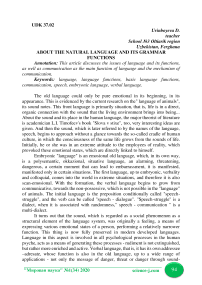About the natural language and its grammar functions
Автор: Urinboyeva D.
Журнал: Мировая наука @science-j
Рубрика: Основной раздел
Статья в выпуске: 1 (34), 2020 года.
Бесплатный доступ
This article discusses the issues of language and its functions, as well as communication as the main function of language and the mechanism of communication.
Language, language functions, basic language functions, communication, speech, embryonic language, verbal language
Короткий адрес: https://sciup.org/140265075
IDR: 140265075 | УДК: 37.02
Текст научной статьи About the natural language and its grammar functions
The old language could only be pure emotional in its beginning, in its appearance. This is evidenced by the current research on the" language of animals", its sound notes. This front language is primarily situation, that is, life is in a direct, organic connection with the sound that the living environment brings into being... About the sound and its place in the human language, the major theorist of literature is academician L.I. Timofeev's book "Slova v stixe", too, very interesting ideas are given. And then the sound, which is later referred to by the names of the language, speech, begins to approach without a glance towards the so-called cradle of human culture, in which the consciousness of the same life grows from the sounds of life. Initially, he or she was in an extreme attitude to the employees of reality, which provoked these emotional states, which are directly linked to himself.
Embryonic "language" is an emosional old language, which, in its own way, is a polysemantic, okkazional, situative language, an alarming, threatening, dangerous, a certain moment that can lead to embarrassment, it is manifested, manifested only in certain situations. The first language, up to embryonic, verbality and colloquial, comes into the world in extreme situations, and therefore it is also scan-emosional. With the formation, the verbal language begins to grow from communicative, towards the non-possessive, which is not possible in the "language " of animals. The initial language is the preposition conditionally called "speechstruggle", and the verb can be called "speech - dialogue". "Speech-struggle" is a dialect, when it is associated with randomness," speech - communication " is a multi-dialect.
It turns out that the sound, which is regarded as a social phenomenon as
a
structural element of the language system, was originally a feeling, a means of expressing various emotional states of a person, performing a relatively narrower function. This thing is now fully preserved in modern developed languages. Language in this aspect is involved in all psychological processes in the human psyche, acts as a means of generating these processes - rudiment is not extinguished, but rather more enriched and active. Verbal language, that is, it has its own addressee –adresate, whose function is also in the old language, up to a wide range of applications - not only the message of danger, threat or danger through sound-

information was not given, but also invited to get rid of it, the threat was called to escape, to hide. This primitive circle of Appeal in the language has gone, and at the same time, in connection with the fact that the same circle of Appeal has gone, the function of the language has also gone. By now, more than thirty language functions, characteristic of the language and its elements, are shown.
The above view and the mechanism of speaking on theories is the main emphasis on psychological and physiologic factors as the causative and organisational factors. The physiological factor adjusts the motion Apparat, it releases the sound from uniformity, serves for its social function performance, while the psychological factor brings the same Apparat into motion - the driving factor. Language "produces" both together. "The sound means of expression of emotion are formed as a means of expressing things, their characteristics and relationships in stages, they begin the function of pre-conceived message-notification".
The human language is one-sidedness, only the communicative function does not remain in the field, it differs from the "language" of animals and birds, when it is spoken about the language..... no matter how convenient the animal "language" is, it is only a means of communication; the human language is the knowledge of the universe and, therefore, interpersonal communication mechanism.
The human language is one of the phenomena that direct his "spiritual power to constant activity" - the possibility of coming to the stops of type. Thus, the sound, which is a signal medium of relations between people, grows into an enlightened language by serving as the basis for the spoken language. It plays a leading role in the appeal of evolution. Thanks to the tireless nature of the need in this field of application, the interaction of language with consciousness and thought and conditioned, the function of which is also shared, acquires profound meaning. The object is formed at the level of the clairvoyant, the totalist, the clairvoyant of reality - the whole being, which is reflected in the human consciousness. In the process, it itself becomes the second being - the means by which it summarizes and expresses the first being in itself. About it A. G.Spirkin and V. V. Reacting to the conclusions of Martinovs, E. N.Y. Panov writes: "only thanks to the language a person will have the opportunity to move from the knowledge of individual subjects and employees to the generalized perception of them in the form of consciousness." All knowledge about the existence lives in the memory and language of man. Lingvist V.V.Martinov language called us very found as "1-being", in contrast to "2-being", which is an external reality that surrounds us. In this sense, language is an element of human conscious activity and thinking, it participates in the injury of both spiritual and spiritual scholars, along with the fact that it consists of a whole system of data-gathering, aggregating, reflecting the first being.
The material world, created again as a spiritual and spiritual world, thanks to the activity of thought, exists and lives in the human mind as a matter of Language, Language "re-pours the material of the world of things and phenomena in the form of thought". Approved by A.R.Petrenko, V.Martinov and it turns out to be the second one, as defined by the lurians. Despite the fact that the views on the appearance of the second being language are not the same, they are different in

different periods, the attitude, the expression of the attitude to another has remained unchanged.
In the history of linguistics there were also such periods that the communicative function, calculated as the main function of the language, was pushed to the second plan, the essence of which was not considered from this task. "One of the founders of the newest linguistics is V.Gumboldt, language appears not as a "external tool of the attitude of people in society", but as a means of knowing the world, "the forces of reason and the worldview of them (people) arise as a means of "development of being". It turns out that in the language the mind and the worldview are reflected in the body-forming, formative impressions. In the same sense, "language is the conscious expression of the impressions perceived by a person through his various senses by means of sounds". Well, both on the ground of the emergence of the language, the signal came from "language" to "work" in conjunction with thought, progress towards the ascetic language, both on the ground of its functions becoming more and more multifaceted, and as a need in constant communication, occupying a central place.
Список литературы About the natural language and its grammar functions
- Ахманова О. С. Словарь лингвистических терминов. Изд. "Советская энциклопедия". Москва - 1969.
- Панов Е. Н. Знаки, символы, языки. Москва. "Знание". 1980.
- Гумбольдт. Избранные труды по языкознанию. Москва. Прогресс. 1984.


